#Edinburgh Printing
Explore tagged Tumblr posts
Text


Oh king is in heaven 😂🐆💅


Love how she’s literally ‘just’ a fan that gets to live the dream and love him for making it possible




A bunch of videos plus the SETLIST

#13/11/2034#miles kane#edinburgh#uk tour 2024#all huddled up#but damn is he cold resistant cause I’d be a frozen block of ice wearing just a leather jacket#our cheetah print diva#so happy he’s finally playing some change the show tunes
15 notes
·
View notes
Text


April 4th 1508 saw the production of the first printed book in Scotland.
On 15th September 1507, King of Scots, James IV, granted Walter Chepman, an Edinburgh merchant, and his business partner Androw Myllar, a bookseller, the first royal licence for printing in Scotland.
Although the licence was actually granted to enable the printing of the Aberdeen breviary (a book of Scottish church practices and the lives of local saints complied by William Elphinstone, Bishop of Aberdeen) ‘The Complaint of the Black Knight’ by John Lydgate is the first known work from the press, printed by Chepman and Myllar on 4th April 1508 in a tenement belonging to Walter Chepman in the “Southgait”- or the Cowgate.
Although in later centuries the Cowgate, and neighbouring streets and closes would become notorious for its slums, in the reign of King James IV it was a relatively new and fashionable address, where many prominent courtiers, nobles, and prelates had their town houses. It is clear from the privy seal charter which serves as the earliest evidence of the Southgait press that the fledgling printing business was not set up on a whim. The charter states that it was founded “for imprenting of the bukis of our lawis, actis of parliament, croniclis, mess bukis and portuus, efter the use of our realme, with additionis and legendis of Scottis sanctis now gaderit to be ekit thairto, and al utheris bukis that sal be sene necessare, and to sel the sammyn for competent
A plaque commemorating the event was unveiled on 4th April 2008
6 notes
·
View notes
Text

Edinburgh by night-Michael McVeigh
3 notes
·
View notes
Text
HEY GUESS WHAT? I HAVE PRINTS OF THE DR. MACFELL'S TINCTURE OF LAUDANUM AD AVAILABLE ON INPRNT NOW
Everything from 4x5 to poster size! You know you wanna hang this madness in your house somewhere.
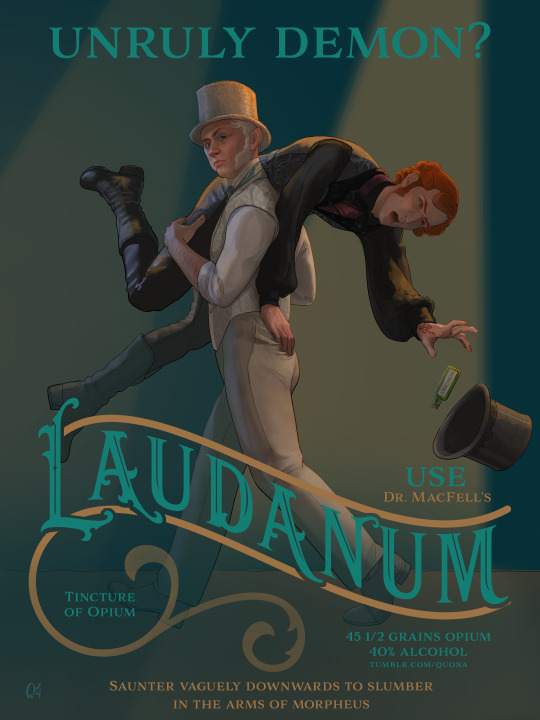
UNRULY DEMON? Try Dr. MacFells LAUDANUM tincture! Guaranteed to knock his ass out. Detail shots after the jumppppppppp ⬇️
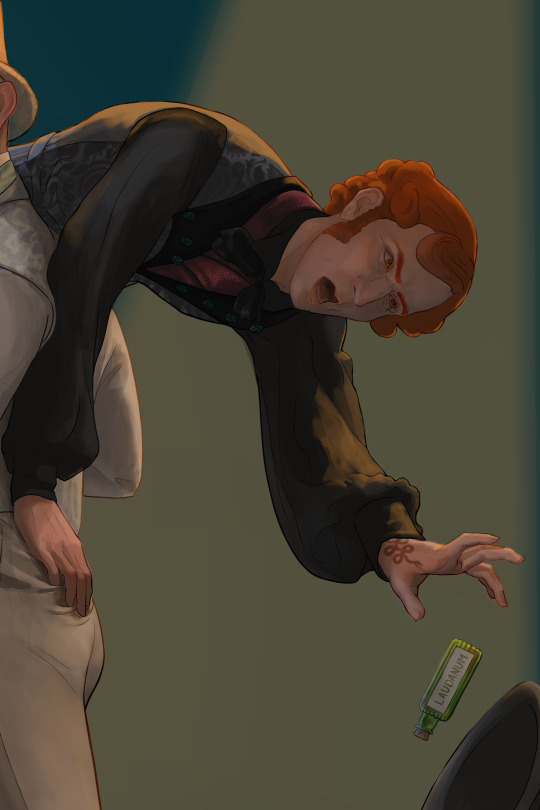

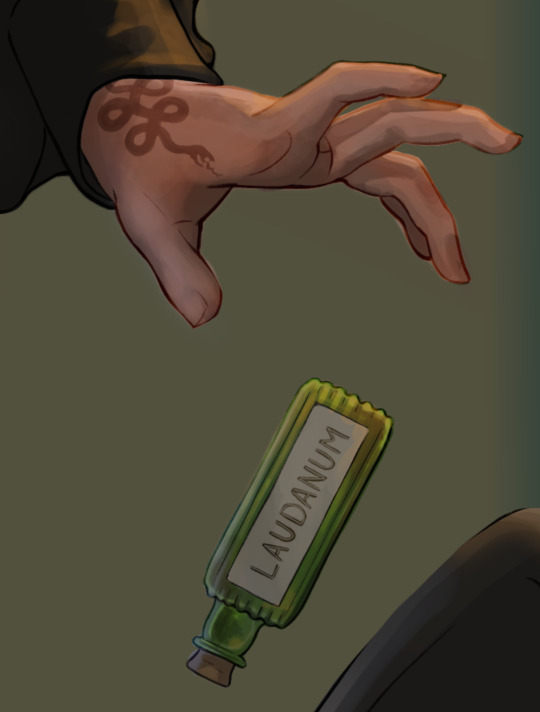

@goodomensafterdark
#laudaddy#good omens#good omens fanart#aziracrow#aziraphale#crowley#my art#art prints#1827 aziraphale#1827 crowley#edinburgh 1827
2K notes
·
View notes
Text
We're thrilled to announce that we'll be at the Secret Solstice Games' Friendsmas event in Edinburgh featuring its first Mini Maker Market!
Whether you're in the mood for some holiday cheer with some potluck food and boardgames or looking for some last-minute gifts, Friendsmas has something for everyone.
The market will run all day on Sunday, 22nd December from 12-10pm, potluck from 6pm on! See you there, and stop by to see us for some fine art paintings, illustrations, and prints!






#fine art#secret solstice games#edinburgh#mini maker market#makers market#friendsmas#yuletide#yule#christmas#winter holidays#paintings#illustrations#prints#fine art prints#gifts#gifting#christmas presents#yule presents#game devs#artists#artlyfe#art#edinburgh scotland#game stores#community hub#boardgaming cafe#boardgaming#cafes
1 note
·
View note
Photo

Edinburgh Calton Hill Print - Serene Cityscape Art, Scotland Landscape, Home Decor
#Edinburgh Landscape#Home Decor#Travel Artwork#Nature Print#Watercolor Art#Gift Idea#Wall Art#Panoramic View#Architectural Print#Scottish Scenery#Romantic Scene#Art Collectible#Calton Hill Print
0 notes
Text
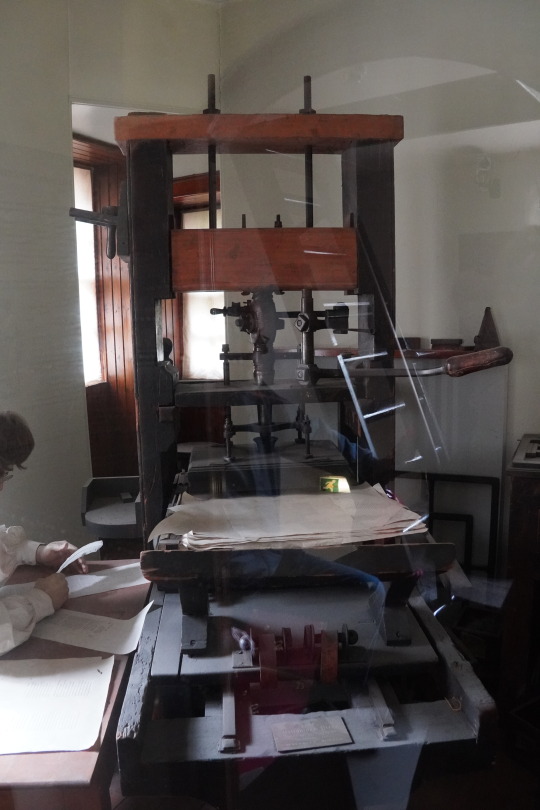
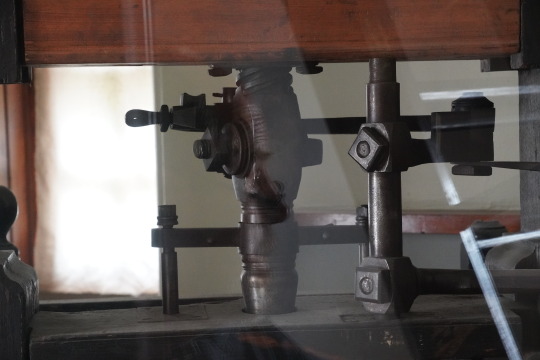

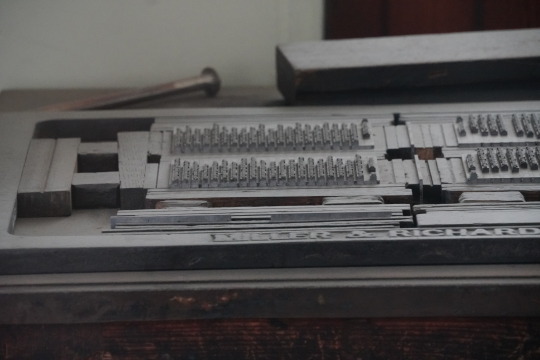


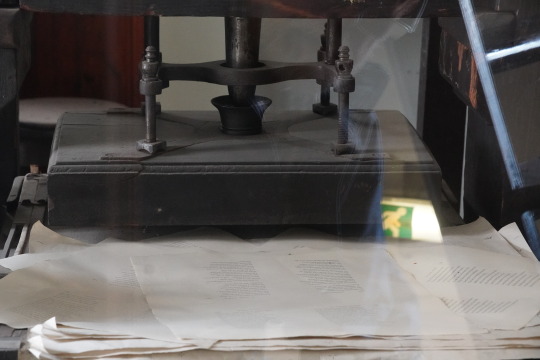
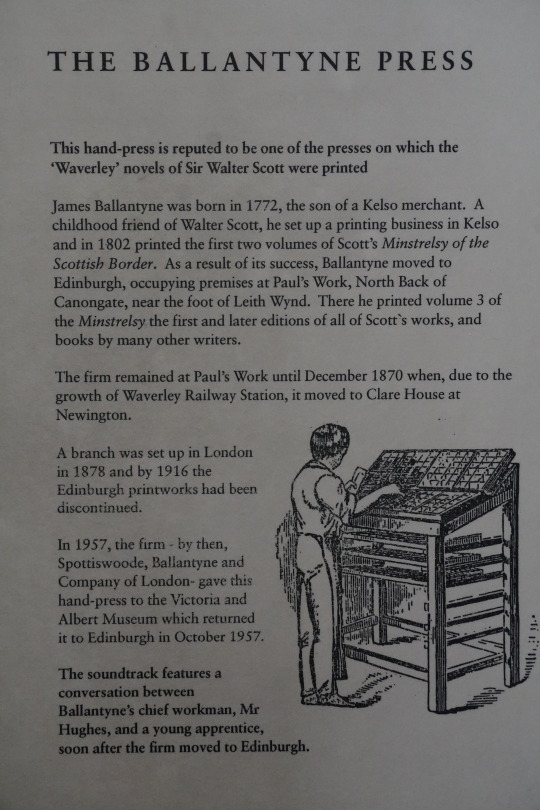
The model press room from the top story of the writer's museum. It's more heavy duty than Stevenson's personal press, although I don't know that it's any more modern. Didn't get a sense for that. It may actually be older, given how long the Ballantyne press was in Ediburgh.
My maternal grandfather was a printer because all of the printers he knew lived long enough to retire, so this kinda has sentimental value. Also, while a very different sort of press, it reminds me of the boys on @alex51324 's Island.
1 note
·
View note
Text


A little reminder that my SACRED BODIES talk and signing is this upcoming Saturday, 15th of March at 4 - 6 PM, hosted at La Belle Adventure in Leith Walk, Edinburgh! I'll have books, prints and hopefully some interesting stuff to say too. :}
313 notes
·
View notes
Text





✨🐍My Secret Santa gift for @edit-by-riley !🐍✨
A very Scottish Crowley in his Edinburgh outfit from Good Omens S02e03's minisode "The Resurrectionists"!
Have sweated a lot searching how to draw his hair and colour his 'black on black on darker black" gorgeous outfit, but I don't regret anything!
Happy New Year Riley! Happy New Year dear followers and friends!!!
Linktree - Masterpost - Ko-Fi - Prints of my Art here!
Tag-list (ask in comment to be add if you want to be notified next time I publish my Good Omens arts and WIPs! A lot of secret work is almost done and is coming!!!)
@goodomensafterdark ;
@floscrap-blog ; @demonsandpieohmy ; @amagnificentobsession ; @captainblou ; @mamamissy
@ineffable-hyperfixation ; @itsscottiesstark ; @moralsofanalleycatsposts ; @featheredboaconstrictor ; @lenareadly
@fearandhatred ; @eybefioro ; @crowleys-bentley-and-plants ; @ashfae ; @crowleys-hips;
@paperclipninja ; @silverdphantom ; @neverlet ; @naturallyteal ; @goodoldfashionedlovergirls-blog ;
@madaims; @daisydimple20092 ; @seraphhiim ; @rebeccakatmauri ; @cobragardens
#good omens#crowley#david tennant#good omens fanart#my art#elenthyaandgoodomens#artists of after dark#artists on tumblr#probably one of the most gorgeous AND difficult outfits in all the minisodes I have ever decide to draw and adapt in my style#so happy I can finally show this one!!!!
210 notes
·
View notes
Text
Duchess of Edinburgh’s Sapphire Suite
Yesterday, the Duchess of Edinburgh wore her complete set of new sapphire jewelry for the first time so let's take a closer look. The suite was made by Graff for their 2014 high jewelry collection. Each piece features sapphires and diamonds in a variety of cuts. Graff is a British jeweler known for their focus on high quality, and usually very large, gemstones.

The collection is called Nuage which means cloud in French and you can see that some of the scroll elements resemble clouds. Sophie even wore a dress printed with clouds when she debuted the earrings.

She first wore the earrings in June and December of 2022 and then added the bracelet for King Charles III's coronation in May 2023.

Last night for the Qatari state banquet, Sophie wore the necklace, bracelet, and earrings with her Aquamarine Necklace Tiara.

Sophie did not really go on the type of visit where they give substantial jewelry gifts in the years between when the last time the official gift list was released in 2019 and when they were debuted in 2022 so I would guess that they belong to her personally. As for how much they cost, I have no idea because they were POA or price on application when they came out which usually means if you have to ask you can't afford it.

The suite is really stunning and I can't wait to see the Duchess of Edinburgh wear them again.
#Duchess of Edinburg#British Royal Family#Tiara Talk#Countess of Wessex#Graff#United Kingdom#sapphire#necklace#earrings#bracelet#non tiara#jewels#jewelry#royal jewelry
163 notes
·
View notes
Text


On September 14th 1507 Edinburgh merchants were granted exclusive privilege of running a printing press.
Another one with dates that differ by a day or so, but all agree it was mid September 1507 thatJames IV granted a Royal Patent authorising Scotland’s first printing press.
You will no doubt be surprised that the printing press with moveable types wasn’t invented by a Scotsman. However, Scots have certainly made good use of the technology since it was invented by Johannes Gutenberg in Mainz, around 1439. It was a good fifty years after Gutenberg’s monopoly was revoked before a press found its way to Scotland. By the arbitrary Incunabulum date of 1500, when around a thousand printing presses were in operation throughout Western Europe and had produced anything between eight and twenty million books, Scotland still lacked a press of its own. Nevertheless, the Scots hadn’t been idle bystanders as many were educated in France and elsewhere and brought back printed books from the Continent. That’s not to say that Scotds had not made use of this new invention, Some sought out the printing press on the continent and had books published there. It should come as no surprise either that in France some Scots were also employed in the new profession of printing and it was one such Scot who had served his apprenticeship as a printer in France, Androw Myllar that brought the art back to his native country.
Myllar was an Edinburgh bookseller who imported books from England and France, where he learned the printer’s craft in Rouen. When he arrived back in Scotland in 1507, Myllar gained the financial backing of Walter Chepman, a wealthy Edinburgh merchant trader and a man who appears to have had the ear of the King, James IV. Chepman also seems to have gained a lot of the credit for Scotland’s first printed books, but then, he was the money man.
When Myllar went into partnership with Chepman, the two men established Scotland’s first printing press, the building was in Edinburgh’s Cowgate, the building is long gone but the pic shows a plaque marking where it stood. Scotland’s first printed books are known as ‘The Chepman & Myllar Prints’, the earliest of which is dated the 4th of April, 1508, which was an edition of John Lydgate’s ‘The Complaint of the Black Knight’.
Sometimes when searching through sources for my posts I find out other little snippets that connect to other posts, like in the article “Printing Comes to Scotland” which you can read on the link below, I learned that there was an account of The Battle of Flodden made on an early printing press, it is titled “The trewe encountre or Batyle don betwene Englande and Scotland” and while it may have been printed in London, it does give an insight into early bias in print. In the pamphlet it claimed that around 10,000 Scots were put to the sword at Flodden, this figure is used a lot but most historians discount the amount now, but the bias is not in that number, the pamphlet claims that the Earl of Surrey lost only a few hundred at the battle. Now I hark back to previous posts about how good the English are at keeping records, most recently in my post regarding Sir William Wallace’s murder, well records of the payroll show that Surrey, the English commander, lost two-fifths of his own retinue, even with these figures available, Wikipedia, which I look at every day, still states that English losses were a mere 1,500 of their 26,000 army, you do the maths, yes it was a massive defeat for the Scots, but it was a bloody hard fought battle with large casualties on both sides.
Pics are the plaque on the Cowgate, the second an early example of Myllar’s work, the windmill is apparently a pun on his surname.
7 notes
·
View notes
Text
arcane characters as college staff
Mel
History professor
Refers to all students by (honorific) (surname)
Nothing but praise on ratemyproffesor
“I didn’t like history until I took Professor Medarda’s class”
Doesn’t write scholarly articles, just giant ass books that she pumps out almost every year somehow
Quickly responds to emails. No response = its in the syllabus
“Is there any make up work I can do to get my grade up—“ Absolutely not
But if you go the writing center you can get extra credit
Every year her students ask for an extension on the final project and every year she gives a long and furious rant about how the project was visible online from Day 1 and they had all semester to work on it
She has a beautiful office that looks like a miniature library and she only sees students by appointment
Jayce
Physics professor
Is a prolific author but somehow can’t figure out how to set up the course online
Prints cheesy physics memes
Every zoom meeting begins with 1000 messages saying “professor Talis we can’t hear you your mic isn’t on” every. time.
you can come see him in his office any time, door’s always open
but his office is so messy you probably won’t be able to sit because he has a stack of papers on every chair
“Everyone got this question on the exam wrong so I’m going to give everyone credit because that means i didn’t teach it properly”
Always throws an end-of-year party at his place
Caitlyn
English Literature professor
would win best dressed of the staff, always shows up in the slacks-and-blazer fit
“To understand why the narrator wears red shoes, we need to take a look at the sociopolitical state of Edinburgh in 1864.”
if you reply to a discussion board post with just “I agree” you’re not getting credit and it isn’t up for discussion
Never reads contemporary fiction. The “newest” book she’s read is The Great Gatsby
“We’re not having a party but if you want to bring snacks and soda to the last day of class that’s fine”
Covers a lot of authors but it somehow always comes back to Emily Dickenson
Is that teacher that assigns 400-page books every week
Constantly publishing in lit journals (rumor has it she writes steamy open-door romance books under a pen-name but no one has confirmed this)
Ekko
Art professor
You have to actively screw up to get a bad grade with him
He wrote thousands of letters to the board until they caved and gave the class a proper kiln
“Write a three-page essay explaining why AI art is not art and insisting otherwise is spitting in the face of humankind. Double spaced. Due Friday 11:59”
Throws back coffee. Has a coffeemaker in the studio. Two of them.
“Hey guys some of you are submitting assignments at 2 in the morning. It can wait until the next day. Please get some sleep.”
He’s created awe-inspiring pieces but if you just wanna paint a frog wearing a hat he’ll say “that’s cool”
Says he knows who banksy is but will never tell
He gets way too deep in the zone. Once reached for his coffee cup while painting, drank paint water instead. Didn’t notice.
Jinx
Chemistry professor
If you email her the response will be “k” or “no” and nothing else
Waits until twenty minutes after the class begins to email everyone that class is canceled
Never wears a coat, goggles, or gloves. But will call out students if they don’t
takes 5 years to post grades
“Look I’m not remembering any names. Too many. If I’m talking to you I’ll just point”
Puts a meme on the projector every day. Mostly incomprehensible. Picture of a horse on an beach and it just says “Zimbabwe”
lowest score on ratemyprofessor
someone creates a website called ratemystudent and administration has no proof that it was her because technically the students with bad scores being the same students that get bad grades in her class can be coincidental
Viktor
Biomedical engineering professor
Only professor who still uses chalkboards
First day of class is first day of class. No reviewing the syllabus, turn to page 34 in your textbook.
Puts things in the syllabus to catch people who use ChatGPT. If you’re caught, you’re removed from his class. Immediately. You will not get to plead your case.
Most of his cited sources are himself
Literally begs students to thrift their textbooks online instead of buying them from the school. Provides free PDFs as often as he can.
He reads journals every day and will write personal letters to authors he disagrees with
If a student asks a particularly dumb question he’ll step out of the room for ten minutes to compose himself and then resume teaching like nothing happened
Vi
Not a professor, works at the on-campus gym and leads clubs
Constantly curses without batting an eye. Students will leave class with their very uptight professor then come to the soccer club where vi walks in like “sorry I’m late guys i had a motherfucker of a headache this morning”
Please don’t ask her about anything that isn’t club or sport related. If you ask for directions or how to get in contact with student services she’s got nothing
If she refs for a game and you’re on the opposing team you’d better watch yourself. She will rip you a new one if you break any rules. One time a player grabbed one of her member’s mask during a game and he left crying after Vi was done with him
Students run into her at the local hangouts a lot but it’s never awkward. just reminds you not to party too hard before the game tomorrow
Leads pretty much every club but dance. Wouldn’t admit it but she has no sense of rhythm and refuses to even do it as a student
You can call her coach or captain or just Vi, whatever you want. But if you call her Violet she’ll stare you down until you correct yourself
Heimerdinger
Anthropology professor
Spends the first day of class getting to know everyone. “We’re going to go around and give our names and a fun fact about ourselves!”
Gives the “Nacirema” assignment and can’t wait to tell everyone the catch
His classroom is filled with artifacts. Don’t ask about any of them because it will take up class time
If you can’t make it to class he sends really nice responses saying he understands, then checks in when you come back
The only thing that puts him in a bad mood is the “why do anthropologists study dinosaurs if anthropology is about people” question. He’s old and tired
Keeps thinking about retiring, keeps changing his mind
Silco
Political science professor
His classroom is bare and blank. No life. Just fluorescent lights and chairs.
Brags about how few people pass his class
Very strict on attendance. Too many absences and you’re out.
If the assignment is due at 11:59 and you turn it in at 12:00, it’s late
“I am quite interested to hear why you believe you are deserving of a higher grade when you’ve spent less than thirty minutes attending all of my classes combined. Please, continue.”
Will straight up roast other professors no problem. Encourages students to pass it along
He encourages debate but the only thing students debate about outside of class is whether he’s hot or creepy af
Final project is a choice between A) A ten-page essay on why there is no ethical consumption under capitalism, or B) a presentation on why the country is doomed
Vander
Education professor
Makes his own series of Crash Course-esque videos
Comes to class in jeans at best. Sweats, sometimes.
He has one coffee mug that says #1 Dad and he refuses to use anything else
He puts fun questions on his exams, like riddles. If no one gets it, he actually gets sad
Whenever he erases the whiteboard he always misses a spot. He’s that professor.
If he catches you plagiarizing, you get one pass before he reports it. But you have to come to his office so he can tell you how disappointed he is and how much potential you have
He gives a seminar about how worried he is for the future of education and the wellbeing of the next generation and everyone leaves feeling guilty. Everyone.
Make a pop culture reference in class and everything will grind to a halt so you can explain it to him. Visuals help.
Sevika
Librarian
If you play music in the library she’ll walk up to you and just go “are you joking”
Have a phone call on speaker and she’s hanging it up for you
There’s signs telling you to be quiet every three feet
If you see her outside of school no you didn’t
She’s in charge of leading classes on accessing academic databases and she fucking hates it
Somehow knows where every book is down to the shelf. She’ll tell you what you’re looking for before you can finish your sentence
technically she’s supposed to do a walkthrough before closing for the night but if you can’t read the library hours on the signs it’s your fault if you get locked in
#Arcane#vi arcane#caitlyn kiramman#viktor arcane#jayce talis#jinx arcane#silco#vander#heimerdinger#sevika#ekko#Mel medarda
94 notes
·
View notes
Text

This fandom has the best artists in the world I stg. Every time I look at my wall I get so fucking happy ❤️❤️❤️ yall are so talented and wonderful, and I hope all your crops are watered and you’re thriving
Tags/links for each poster under the cut :)
Bentley running over the Metatron - @gleafer
Aziraphale with the bees, Crowley with the birds, and purple demon - @/icanbelouder on Instagram
Gladiator Crowley, 1941 Crowley, snek Crowley, and snek Crowley keychain - @angellilou-art
Crowley surrounded by snakes, Aziraphale surrounded by feathers, girl in field, and I THINK the girl with the hair (I managed to lose it to the shadow realm somehow when I went to look at the back for credit) - @cherriielle
Saturday Celestial Post and A.Z. Fell and Co coupon - @lightsintheskye
Lots of Crowley’s - @doodlenoodleh
Sandman light box - @/decofriki on Instagram
Special shoutout to BXTHstudio and @cesiscribbles for the absolutely precious stickers and bookmarks 🥰 be sure to check them out, too!
#m rambles#good omens#the sandman#aziracrow#ineffable husbands#anthony j crowley#aziraphale#morpheus#wanted to give all the artists kudos :)
67 notes
·
View notes
Text


























So I clearly have normal feelings about the John Irving playlist.
This unholy blend of selected lyrics and other scraps is what my brain has been doing for the last several hours. Sources below the cut.
Lyrics pulled from songs off the Irving playlist are colored blue, and Bible verses from the King James Version (KJV) are colored red.
"For the way is straight and narrow," from "You Must Unload" which appears three ENTIRE times on the playlist.
"Enter ye in at the strait gate," from Matthew 7:13-15 (KJV).
Image of a copy of the Holy Bible found by the McClintock Search Expedition in an abandoned boat at Erebus Bay, King William Island, in May 1859, now in the collection of the National Maritime Museum in Greenwich.
Screenshot ("Turn your wolf's ear to me now,") from "The Ladder," the third episode of The Terror (2018).
Screenshot ("or the next piece of counsel,") from "The Ladder," the third episode of The Terror (2018).
"I give you hard felt reliquary," from "Come and See" by Fox Apts.
Engraving from an 1890s broadsheet, captioned "The Cases Containing the Franklin Relics."
"Love is blindness," from "Love Is Blindness," by Jack White.
"Stop staring at the waves," from the musical Swept Away.
"This magnanimity in your sacred Majesty," from Oedipus Tyrannus Or, Swellfoot the Tyrant, a Tragedy in Two Acts (1820) by Percy Bysshe Shelley.
Screenshot from "A Mercy," the sixth episode of The Terror (2018).
"Some say I got devil," from "Some Say I Got Devil," by Morrissey.
"Should the ice not clear away," from Lieut. John Irving, R.N. of H.M.S. "Terror" in Sir John Franklin's Last Expedition to the Arctic Regions: A Memorial Sketch with Letters (1881) edited by Benjamin Bell, digitized by Arctonauts here.
"Who shall separate us," from Romans 8:35 (KJV) engraved into the grave of John Irving in Edinburgh, Scotland.
"Now I've left my teeth marks," from "Phantom Of My Organ," by Slowblow.
"Then you die first," from the musical Swept Away.
"Who's seen Jezebel?" from "Jezebel" by Iron & Wine.
"Grave of Lieutenant John Irving, R.N., and Relics of H.M.S. Terror (1847), with a view of Victory Point, King William's Land," an engraving made from a drawing by Henry Klutschak, printed in The Search for Franklin (1897), pg. 51.
"And they went to bury her," from 2 Kings 9 (KJV): 35-37.
"This relic at once identified the grave," from The Search for Franklin (1897), pgs. 53-54.
"'Unto others...' scribed," from "Come and See" by Fox Apts.
"And the flood was forty days," from Genesis 9 (KJV): 17-18.
"A small Bible contained numerous marginal notes," from The Voyage of the 'Fox' in the Arctic Seas: A Narrative of the Discovery of the Fate of Sir John Franklin and his Companions (1859) by Leopold McClintock, pg. 295.
"God, he called for rain," from "The Ark" by Dr. Dog.
Screenshot ("It is no accident") from "The Ladder," the third episode of The Terror (2018).
"Feathered friend, dig up and resurrect me," from "Old Note," by Lisa O'Neill.
#john irving#lieutenant john irving#the terror#the terror amc#terrorposting#franklin expedition#webweaving#christianity cw#SO MUCH christianity lmao#this darling is so fucked up god absolutely bless
83 notes
·
View notes
Text
Drarry fic rec: RON-DRACO FRIENDSHIP
I found this list in my phone recently and honestly couldn't understand why I hadn't posted it yet, so here it is. The criteria for this list is Ron-Draco friendship isn't based on Draco and Harry's relationship. Whether Harry and Draco are on good terms or not, Ron and Draco are still friends.
I love Ron-Draco friendship in Drarry fics a lot. If you also have the same preference, I hope you would enjoy this list.
- Can't Spell Enemy Without Friend (T; 945) by @xx-thedarklord-xx
“Piss off,” Ron said, rolling his eyes. “I’m just saying, what if we are making this bigger than it needs to be? They might not even react.”
“After all the valid shit I’ve said about you over the years?” Draco scoffed. “No one is going to believe that we’re friends.”
Or...
The one where Draco and Ron became friends but refuse to admit it because they don't want to see Harry's smug face
- You've got the antidote for me (M; 20,7k) by Kandakicksass
When Harry Potter unintentionally severs their soulbond before it can fully form, Draco Malfoy resigns himself to a slow death and decides not to burden Harry with a soulmate he's made it very clear he doesn't want.
He's never been selfless before, but for Harry, he can try.
- Peeking behind the Curtain (M; 23,5k) by calrissian18
Draco sees things he really, really wishes he didn't. If only to get out of all the homework that comes with it.
- Give Me A Quiet Mind (T; 16,3k) by calrissian18
Draco is Weasley’s assistant. Except for the week he’s not. Whose brilliant idea was that again? Featuring offices in Edinburgh, an epic Measley Bromance (that no one will admit exists), several unrequited crushes, fantastical revenge scenarios, coffee snobbery, the dreaded – yet adorable – toddler terror, promises of organ swapping, a play about Scottish history (no one cares), sequins, and the League of Snarky Secretaries!
- Blow by Blow (T; 7,3k) by calrissian18
Draco is tired of fighting. He’s still not sure he knows how to stop
- Used to be a Hot Boy (Now I'm Stunnin') (M; 6,8k) by TawnyOwl
“Why the hell would you get a fucking paw print tatted on your shoulder?” He prods, laughing at the ridiculousness of it, performing his usual detection spells on Draco’s wand.
“I didn’t. It’s my fucking soulmate being a fucking dick.”
Ron pauses. He stares. Draco stares back, brow raised in a challenge.
“You’re kidding.”
“You tell me, pureblood. Am I?”
- A Slytherin in Gryffindor Clothing (R; 38k) by mahaliem
Draco hits his head and wakes up in a world where he's a Gryffindor and Harry is a Slytherin
- tinder, flicker, flash (M; 80,3k) by @americanmoths
Molly Weasley takes Draco in after Narcissa, wanted for many murders and schemes, abandons him in the forbidden forest. This is a Drarry story, so obvs your fav schoolyard enemies fall in love, but first Draco has to learn to love his adopted family.
ft. magical Zoom calls, gay solidarity, a prank war, a real war and George Weasley’s unsubstantiated belief in his own psychic abilities.
a story where nobody makes any good decisions, yet everything turns out ok.
(Ron and Draco are more like brothers than friends in this fic.)
Hope you would like these fics!
32 notes
·
View notes
Text
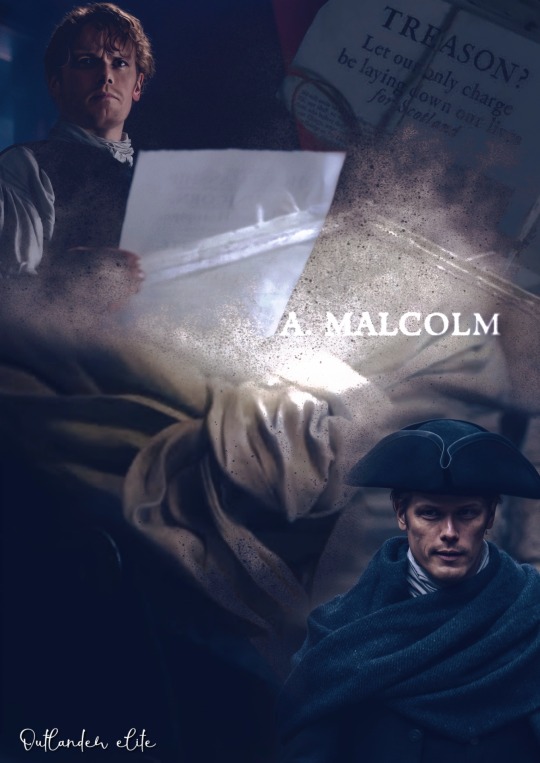
||COUNTDOWN ||SEASON 3 EPISODE 06 || A. MALCOLM ||
#83daysofoutlander☆
“The question is—why have you got a room in a brothel? Are you such a good customer that—”
“A customer?” He stared up at me, eyebrows raised. “Here? God, Sassenach, what d’ye think I am?” “Damned if I know,” I said. “That’s why I’m asking. Are you going to answer my question?” He stared at his stockinged feet for a moment, wiggling his toes on the floorboard. At last he looked up at me, and answered calmly, “I suppose so. I’m not a customer of Jeanne’s, but she’s a customer of mine—and a good one. She keeps a room for me because I’m often abroad late on business,and I’d as soon have a place I can come to where I can have food and a bed at any hour, and privacy. The room is part of my arrangement with her.” I had been holding my breath. Now I let out about half of it. “All right,” I said. “Then I suppose the next question is, what business has the owner of a brothel got with a printer?” The absurd thought that perhaps he printed advertising circulars for Madame Jeanne flitted through my brain, to be instantly dismissed. “Well,” he said slowly. “No. I dinna think that’s the question.” “It’s not?” “No.” With one fluid move, he was off the bed and standing in front of me, close enough for me to have to look up into his face. I had a sudden urge to take a step backward, but didn’t, largely because there wasn’t room.
“The question is, Sassenach, why have ye come back?”
he said softly. “That’s a hell of a question to ask me!” My palms pressed flat against the rough wood of the door. “Why do you think I came back, damn you?” “I dinna ken.” The soft Scottish voice was cool, but even in the dim light, I could see the pulse throbbing in the open throat of his shirt.
“Did ye come to be my wife again? Or only to bring me word of my daughter?” As though he sensed that his nearness unnerved me, he turned away suddenly, moving toward the window, where the shutters creaked in the wind. “You are the mother of my child—for that alone, I owe ye my soul—for the knowledge that my life hasna been in vain—that my child is safe.” He turned again to face me, blue eyes intent. “But it has been a time, Sassenach, since you and I were one. You’ll have had your life—then—and I have had mine here. You’ll know nothing of what I’ve done, or been. Did ye come now because ye wanted to—or because ye felt ye must?”
My throat felt tight, but I met his eyes. “I came now because before…I thought you were dead. I thought you’d died at Culloden.” His eyes dropped to the windowsill, where he picked at a splinter. “Aye, I see,” he said softly. “Well…I meant to be dead.” He smiled, without humor, eyes intent on the splinter. “I tried hard enough.” He looked up at me again. “How did ye find out I hadna died? Or where I was, come to that?” “I had help. A young historian named Roger Wakefield found the records; he tracked you to Edinburgh. And when I saw ‘A. Malcolm,’ I knew…I thought…it might be you,” I ended lamely. Time enough for the details later. “Aye, I see. And then ye came. But still…why?” I stared at him without speaking for a moment. As though he felt the need of air, or perhaps only for something to do, he fumbled with the latch of the shutters and thrust them halfway open, flooding the room with the sound of rushing water, and the cold, fresh smell of rain. “Are you trying to tell me you don’t want me to stay?” I said, finally. “Because if so…I mean, I know you’ll have a life now…maybe you have…other ties…”
With unnaturally acute senses, I could hear the small sounds of activity throughout the house below, even above the rush of the storm, and the pounding of my own heart. My palms were damp, and I wiped them surreptitiously against my skirt. He turned from the window to stare at me. “Christ!” he said. “Not want ye?” His face was pale now, and his eyes unnaturally bright.
“I have burned for you for twenty years, Sassenach,” he said softly. “Do ye not know that? Jesus!” The breeze stirred the loose wisps of hair around his face, and he brushed them back impatiently. “But I’m no the man ye knew, twenty years past, am I?” He turned away, with a gesture of frustration. “We know each other now less than we did when we wed.”
“Do you want me to go?” The blood was pounding thickly in my ears. “No!” He swung quickly toward me, and gripped my shoulder tightly, making me pull back involuntarily. “No,” he said, more quietly. “I dinna want ye to go. I told ye so, and I meant it. But…I must know.” He bent his head toward me, his face alive with troubled question. “Do ye want me?” he whispered.
“Sassenach, will ye take me—and risk the man that I am, for the sake of the man ye knew?”
I felt a great wave of relief, mingled with fear. It ran from his hand on my shoulder to the tips of my toes, weakening my joints. “It’s a lot too late to ask that,” I said, and reached to touch his cheek, where the rough beard was starting to show. It was soft under my fingers, like stiff plush.
“Because I’ve already risked everything I had. But whoever you are now, Jamie Fraser—yes. Yes, I do want you.”
The light of the candle flame glowed blue in his eyes, as he held out his hands to me, and I stepped wordless into his embrace. I rested my face against his chest, marveling at the feel of him in my arms; so big, so solid and warm. Real, after the years of longing for a ghost I could not touch. Disentangling himself after a moment, he looked down at me, and touched my cheek, very gently. He smiled slightly.
“You’ve the devil’s own courage, aye? But then, ye always did.” I tried to smile at him, but my lips trembled.
“What about you? How do you know what I’m like? You don’t know what I’ve been doing for the last twenty years, either. I might be a horrible person, for all you know!” The smile on his lips moved into his eyes, lighting them with humor. “I suppose ye might, at that. But, d’ye know, Sassenach—I dinna think I care?”
I stood looking at him for another minute, then heaved a deep sigh that popped a few more stitches in my gown. “Neither do I.”
25 HOUSE OF JOY ~voyager
#outlander#outlanderedit#outlander starz#the frasers#jamie fraser#outlander series#samheughan#outlander fanart#jamie and claire#jamie&claire#claire beauchamp#dr claire randall#claire fraser#outlander books#outlander season 3#outlander 3x06
69 notes
·
View notes